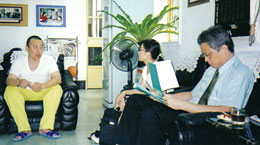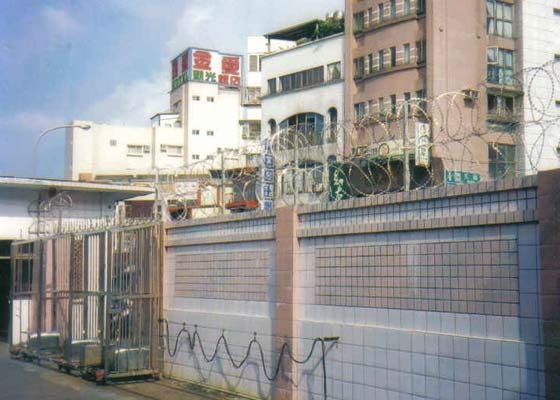Taiwan Association for Human Rights (Taiwan)
The Taiwan Association for Human Rights (TAHR) is a broad-based non-governmental human rights organization with a mandate to address violations of human rights and promote the values of the rule of law in Taiwanese society. The contribution I made to TAHR centered on representing two refugees from mainland China seeking political asylum and transport to the United States. Representing these clients involved performing legal research, direct advocacy and coordinating media relations.
Chen Rong-Li spent eight years in a People's Republic of China (PRC) prison after being arrested in 1995 for attempting to participate in a democratic political party in provincial Jiangsu. The government released him in December 2003, but he continued to face police harassment and stints of forced "re-education" in government prisons. To escape persecution, he took a fishing boat out of Xiamen on January 31 of this year, and, halfway to Taiwan, began swimming toward the shores of Kinmen. Before he got there, he was picked up by the Taiwanese coast guard. After processing, he was sent to the Ilan Chinglu detention facility for illegal Chinese immigrants, where he has spent the last six months awaiting a response to his request for asylum in the United States.

A higher profile Chinese dissident joined him there on June 3. Yan Peng, a political activist since the June 4, 1989 Tiananmen Incident, has been arrested and detained repeatedly over the years in Shandong Province. In September of 2002, after mainland authorities had already held him in custody for over a year, he was sentenced to a year and a half with no credit for time served. Released this year, Yan found work managing a restaurant but faced constant police harassment, including the restaurant's water and electricity being shut off. Fearing for his safety, Yan swam on June 2 towards the shores of Kinmen as a Chinese military vessel gave chase, trying to shoot him in the water until a Taiwan coast guard boat pulled him out of the sea. He has shared the accommodation of Chen Rong-li since.
To prepare for assisting on these cases, I researched immigration and refugee law for jurisdictions in Asia and North America and the rights of aliens under international and comparative law. I also translated all available media material on the arrival of the two men from Chinese to English and reviewed prior cases of political refugees in Taiwan. I determined that without domestic refugee law or United Nations membership, refugee decision had largely been made on a case-by-case basis with media pressure and personal connections as the deciding factors.
Direct advocacy in the case of Yan Peng was initiated by meeting TAHR and myself had with Cabinet member Ching-Huei Hsieh. While requesting that we limit media attention, the government agree to move forward on asylum determinations for them. In late June, I had my first chance to visit Yan as a member of a TAHR delegation. He recounted his story and discussions centered on how the case had and might proceed.
Next, I attempted to contact American officials both in Taiwan and the US in the hopes of verifying that the US government had received asylum requests for both Chen and Yan and was dealing with them accordingly. Letters, faxes, and phone calls to various officials at the American Institute in Taiwan (AIT) were simply ignored. The political division had no interest in talking about dissident or asylum issues to a law student. The public affairs division seemed too busy to discuss how to build a stronger network between Taiwanese NGOs and AIT, and I can only assume (it's hard to be interpret silence) that the Director Douglas Paal had absolutely no desire to discuss Chen's or Yan's case with an interning law student.
As a second tactic, I thought I tried approaching American officials in the US whose files include the PRC and human rights. The Congressional-Executive Commission on China submits an annual report on human rights to the President and the Congress. I pinned my hopes that the Chair, Congressman Jim Leach, or the Co-Chair, Senator Chuck Hagel, would be able to provide assistance or advice. I received no reply from either of their Washington offices.
After a second visit* to both men and little progress on the cases, TAHR changed tactics from directly lobbying the government to attempting to generate public pressure for the resolution of the cases through media attention. TAHR held a pressure conference on Monday, August 9, on how these men's cases are being ignored by officials. The panel including Tiananmen student leader Wu'er Kaixi and criticized Taiwan's lack of refugee laws, the government's hesitation to address the plight of those detained after fleeing the PRC, and the lack of progress in the cases of Chen and Yan. The amount of the media attention generated was moderate, and the government response was that they are actively working on the files. I personally wrote an article for a Taiwanese magazine, Pots, recounting the story and noting the domestic law gaps that allow such cases to exist. Unfortunately, both men remain in detention.
Although the cases of Yan Peng and Chen Rong-Li accounted for the majority of my contribution, I also worked on numerous smaller projects and research tasks. I researched the death penalty and the state of developing customary norm against it. I also reported on comparative data protection laws and the use of biometric features on ID cards for TAHR's campaign of a government proposal for such features on Taiwanese national ID cards. Additionally, I participated in drafting of suggested amendments to Taiwan's proposed refugee law. Finally, I had the opportunity to meet with Theresa Chu and discuss the Taiwanese lawsuit against Jiang Zemin concerning the persecution of falun gong practitioners.
In retrospect, I gained practical experience working on real issues and developed new understandings about the interaction of law, advocacy and activism. I look forward to applying what I learned as I continue to engage in China-related issues and participate in the promotion of human rights within the University of Toronto, Faculty of Law and beyond.

* As a side note, Tiananmen student leader and activist Wang Dan accompanied the TAHE delegation on the second visit. Wang Dan could personally couch for Yan Peng's participation in the democratic movement in China. It was an amazing experience and perhaps the highlight of my trip to meet Wang Dan and spend the day with him.


